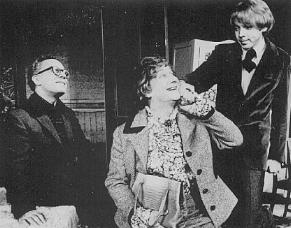 WISE CHILD
WISE CHILD
(1972 Broadway Comedy/Drama)


STARRING: Donald Pleasence (Mrs. Artminster/Jock Masters), George Rose (Simon Booker), Bud Cort (Garfield "Jerry" Artminster), and Lauren Jones (Janice)
DIRECTOR: James Hammerstein
SCREENPLAY: Simon Gray
PRODUCER: Paul Alter
This production opened on January 27, 1972 at the Helen Hayes Theatre.
It closed two days later after four performances and thirteen previews.


WISE CHILD
A review by Clive Barnes of THE NEW YORK TIMES
Simon Gray is clearly an uneven writer. In Wise Child, which opened last night at the Helen Hayes Theater, he is positively erratic. This essay in the Joe Orton style of a comedy of menace seems more murky than black. Some of the writing is good---noth so good as in his latest play Butley, which is one of the current hits of London---but the total effect is hopelessly muddled and, indeed, dismal.
The play means to shock. It ends up by boring---and this despite a virtuoso performance by Donald Pleasence in the equally virtuoso role of a transvestite criminal on the run from the law.
The play's difficulty is its absence of a clear theme. The play's virtue is a strange paid of heroes---a criminal dressed as a woman, and a boy of homosexual tendencies, to say the least, who fantasizes that "she" is his mother.
Mr. Gray is undoubtedly an interesting writer. His lines often have the bark of truth to them, and frequently an unexpected appositeness, even a grace, that give them an abrasive, biting wit. He knows the value of surprise, but like many other young playwrights he puts too high a price on it.
Here Mr. Gray has taken a psychopathic fantasy and tried to make it work in theatrical terms. The result is characters in a situation that is bereft of a play. They are actors in a farce who are supposed to have the motivations of a comedy, and the conflict of rules first erodes and finally destroys the drama.
A man wanted by the police dresses up as a woman. Well, it is possible---unlikely, but possible. A boy poses as his son. Also possible. But even when they are alone together---right until the end of the play---they never move outside this role-playing. Here credibility is strained. Especially when it seems that the supposed "mother" wants to escape from the supposed "son," and, indeed to sell him to the homosexual boarding house keeper in whose crumbling premises they are staying.
As a play it can only work as fantasy or possibly symbolism---and yet fantasy and symbolism are not the specific qualities of the play. The story is more ridiculous than amusing---and this is sudden death to a comedy, the guillotine mistake.
In London the role of the drag mother was played by Alec Guinness, who to all accounts had much fun with it. But I find it difficult to imagine that he was better than Mr. Pleasence is in the New York version. Feminine and masculine by turn---what a field day a psychoanalyst would have with this---Mr. Pleasence is both queenly and touching. His comic timing, harsh, tough and pointed, is superlative. He is brusquely funny, whether he is tippling from his unending series of whisky bottles, trying to palm off the boy on the complaisant hotelier, or watching with a frantic, animal intensity, while a black chambermaid does a drunken and impromptu striptease for him. There is a savagery and observation here that Mr. Pleasence has taken from the play, but made his own. Funny, battered and yet somehow tragic, Mr. Pleasence is a positive adornment to every line.
In all fairness James Hammerstein's staging, much helped by Peter Larkin's shabbily accurate evocation of a seedy boarding house, gives the play more chances than it really deserves. And nor is Mr. Pleasence's the only performance of note, for Bud Cort, as a fey boy in search of a relationship, is also excellent. His washed-out youth and inarticulate passions were brilliantly expressed in a performance of almost flamboyant spontaneity.
Neither of the other two characters proved so effective. George Rose, always a masterly actor, here seemed to have difficulty in conveying sympathy for the homosexual hotelier trying to buy himself a little beauty, and yet I suspect that more sympathy and less comic eccentricity would have done the play a better service, and probably more sensuality was needed from Lauren Jones as the befuddled servant.
There were a number of plays trying to get out on the stage of the Helen Hayes. A play about role-playing in a relationship, a comedy about the inevitability of destiny, a farce about adjoining bedrooms, disparate desires, and banging doors. But for all the play's trying to get out, not one escaped---and eventually only Mr. Pleasence and Mr. Cort came up smiling.
Review © 1972 THE NEW YORK TIMES. All Rights Reserved.
[ NEW YORK TIMES (Review #2) | NEW YORK POST (Review #3) | PHOTOS | LINKS ]
Above photo courtesy of Christina McClendon
Photos © 1972 Paul Alter. All Rights Reserved.
Playbill artwork © 1972 PLAYBILL INCORPORATED. All Rights Reserved.
Title and logo designed by Karen Rappaport

[ THEATRE | HOME ]




